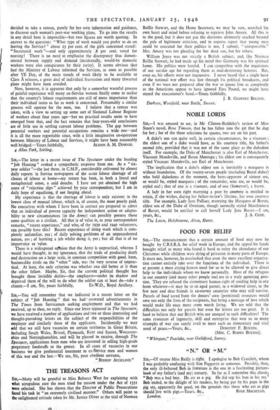THE TREASONS ACT
snt,—.many will be grateful to Miss Rebecca West for explaining with what scrupulous care the men tried for treason under the Act of 1351 were selected. She has shown, that the Director of Public Prosecutions faced his task in "an extremely civilised manner." Others will point to the enlightened attitude taken by Mr, Justice Oliver at the trial of Norman
Baillie Stewart, and the Home Secretary, we may be sure, searched his own heart and mind before refusing to reprieve John Amery. All this is to the good, but it does not put the decisions ultimately reached beyond the pale of legitimate criticism, and to express :egret that young men could be executed for their politics is not, I submit, "irresponsible." Mrs. Amery was not pleading for her dead son, but for others.
William Joyce was not strictly a British subject, and, like Norman Baillie Stewart, he had made up his mind that Germany was his spiritual home. His politics were hateful. I can sympathise with the inquisitors of our secular age for regarding them as soul-destroying heresies. But, even so, his efforts were not impressive. I never heard that a single hour of the national war effort was lost through his political broadcasts, and even if we were not prepared after the war to ignore him as completely as the Americans appear to have ignored Ezra Pound, we might have stayed the executioner's hand.—Yours faithfully,






























 Previous page
Previous page